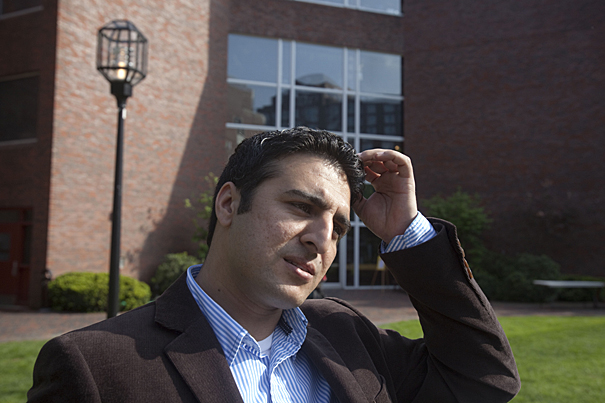
While at Harvard, Ateeq Nosher (left) took part in an integrated curriculum aimed at solving some of the world’s most pressing problems.
Kris Snibbe/Harvard Staff Photographer
Creating worldwide change
HKS program’s graduates use their skills in homelands, international agencies
For Ateeq Nosher, a bloody conflict in the 1980s meant growing up in a refugee camp far from home.
But next month he is headed back to his country of birth, Afghanistan, equipped with a master’s degree from Harvard Kennedy School (HKS) and a desire to make a difference in his homeland, which is again mired in a violent internal struggle.
While at Harvard, Nosher took part in an integrated curriculum aimed at solving some of the world’s most pressing problems. Building on his HKS experience, he will work with Afghanistan’s central bank in Kabul as director general of its monetary policy department, where he will help to control the nation’s inflation and exchange rates.
“If I take asylum and stay in the United States, I will be nothing in my country in five years,” said Nosher. “I have to go and compete.” He is optimistic about Afghanistan’s future, and said its increasingly competitive environment was spurred by the return of many students and professionals who fled in 2001, when the latest round of fighting began.
Nosher is one of the more than 650 graduates from the Kennedy School’s Master in Public Administration in International Development program (M.P.A./I.D.), which includes leaders in the government, nonprofit, and for-profit sectors who are making a major impact on international development.
The program was conceived in 1998, when economist Jeffrey Sachs, then teaching at HKS, noted the rise of Asia and China. That signaled the start of “an unprecedented era of modern history that would change all the rules of the world,” he told a reunion gathering in May.
Sachs, now director of the Earth Institute at Columbia University, realized the potential impact of such globalization, and wanted to create a degree at HKS that offered a multidisciplinary approach to international development. He was looking for a tight focus on practice and policy, one that would help to address critical problems such as AIDS, malaria, climate change, and looming global shortages of water and food.
With all that in mind, Sachs pitched what he called his “irresistible idea” to HKS administrators. They quickly understood, he said, the importance of developing a graduate-level program that would represent a “vigorous way to proceed” in the field.
“Jeff Sachs had an idea whose time had come,” said Carol Finney, director the program since its inception in 1998. “He understood that a lot of international development work was being done by people who had Ph.D.s in economics, but that economics was just one of many points of view that needed to be brought to bear on this topic.”
Now graduating its 10th class, the M.P.A./I.D. is the newest degree at HKS. The program maintains a strong focus on economic and quantitative methods, but also incorporates course work in management, governance, politics, and law. In the second year of the two-year program, students choose electives that allow them to explore related issues such as poverty, health, education, and human rights.
“In this program, we were saying: Let’s take what we know about these various fields and see how we can we use that to solve real policy problems in the word,” said Finney.
The program has another goal, to attract students from countries with developing or transitional economies. Each year, about two-thirds of new M.P.A./I.D. students come from such countries. The hope is that students will train at Harvard and then return to their homelands, said Finney, or that they will represent the interests of their countries while working for multinational organizations such as the World Bank or the International Monetary Fund.
A decade out, that hope has been realized, she said. HKS graduates of the program are making an impact globally. Demian Sanchez ’05 works as the social policy adviser for the Mexican presidency. Emily Stanger ’08 is a program manager for the Liberia-United Nations Joint Program on Women’s Economic Empowerment. Vuk Jeremic ’03 is the minister of foreign affairs in Serbia. Tomás Recart Balze ’08 is the founder of Enseña Chile (Teach Chile), which is modeled after Teach for America.
After graduating from the program, Poranee “Pam” Kingpetcharat ’05 took a job with a consulting firm specializing in international development and globalization.
The HKS program perfectly prepared her for her current work with organizations such as the Ford Foundation and the Bill & Melinda Gates Foundation as well as the United Nations, where she aids peacekeeping operations, she said, helping her understand how to “move people politically once you come up with a great idea.”
The HKS program also provided her with a vast network of contacts.
“There isn’t a day that goes by that I am not calling up some other graduate, talking about development or brainstorming with them ideas or concepts, or even [calling] my professors. … It’s really amazing.”
And while the world faces huge problems, “the M.P.A./I.D. program to my mind exemplifies the ways that we can respond,” Sachs told the reunion crowd gathered at the JFK Forum. “We need to have the heart, we need to have the mindset, we need to have the generosity of spirit, and I think the M.P.A./I.D. is a phenomenal base for that. It’s a real triumph.”




